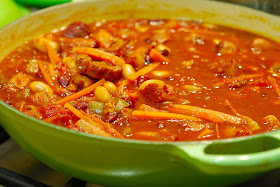 I almost ran out of ideas this time around for our traditional Valentine's Day dinner. Traditional because we celebrate anything just to have a decent conversation over soul food. And also because restaurant food tends to be very expensive during the second week of February.
I almost ran out of ideas this time around for our traditional Valentine's Day dinner. Traditional because we celebrate anything just to have a decent conversation over soul food. And also because restaurant food tends to be very expensive during the second week of February.
The weather is extremely hot at this time of year in the Cape. In spite of this I thought a stewed dish would do the trick just nicely. One is bombarded with ideas for barbecued food and salads, along with recipes for cold desserts. I argued that perhaps one may have a stewed main dish, one with a difference. Then have some delectable sweet stuff afterwards.
So I did some pre-Valentine experimentation.
So I did some pre-Valentine experimentation.
Michael Ruhlman is a great advocate of slow cooking, especially using the Le Creuset range of cookware. I decided to give the dish he made a try. It is a slow cooked stewed pork dish using three kinds of pork to obtain the mix of flavours specific to this dish.
I am not cooking for a large party, so the ingredients are sized to suit. My version of this recipe is also adapted for faster cooking than the traditional French cassoulet, therefore it does not take an overnight effort or two hours in the oven. I used my buffet casserole from Le Creuset, but you can use any thick bottomed pot. Preferably a cast iron one for its heat retention characteristics.
The pork chops may be any cut. Remove the bones and any excess fat. The bockwurst sausages may be replaced by any spicy pork sausages.
You may vary the amount and type of beans in the dish to suit your fancy. You may also use dried beans, as in the original recipe, in which case you will need to soak them overnight.
The beauty of this dish is that it creates its own stock, therefore no additional stock is required. This is also a departure from the normal stewed dishes so traditional to South African cooking. There is a lot less fat in the dish and the flavours coming from the different fried pork products make a welcome change from the traditional lamb shank or beef potjie. The beans make for a naturally thick sauce, so no shortening is required either.
Ingredients
250 g bacon bits
2 Bockwurst sausages, about 200mm long
400g pork chops, cubed
2 onions, chopped
2 cloves fresh garlic chopped and mashed
1 hot chilli pepper, chopped finely
2 cans broad beans
1 can red kidney beans
3 small tomatoes, chopped coarsely. Leave the skin on, it adds taste.
½ sweet bell pepper, chopped
3 carrots, coarsely julienned
some butter or duck fat for frying if the bacon is not overly fatty.
50 ml soy sauce
freshly ground black pepper
some salt to taste
500ml boiling water as needed
1 cup of rice. You may also use couscous for the starch. This dish has a lot of sauce.
Process
Cook the rice or couscous as per your normal procedure.
Cook the bacon bits and sausages in a pan with some water. Allow the water too boil away, then remove the sausages, take the skin off and cut them into wheels. In the meantime allow the bacon to fry nicely in the fat that cooked out with the water.
If the bacon is not very fatty, add a little butter or duck fat to get a nice brown colour on the bacon. You also need some of the meat to stick to the pan itself. Mind that the pan does not burn. You are creating the essence of the stock for the dish.
Remove the bacon from the pan, then fry the cut up sausages and the pork chops separately in turn until they all have a nice brown hue.
Remove them from the pan, then add the chopped onions and sweet bell pepper and fry them in the now nicely flavoured pan until they are translucent (glassy). Add the hot chilli and mashed garlic and fry for a minute. Add a dollop of water if the pan goes too dry at this stage.
Now add the soy sauce, the chopped tomatoes and all the meat. Add a little water too. The browned bits of meat will by now come off the bottom of the pan and form the stock flavouring for the dish.
In the event that you are using dried beans, add them now. In the case of canned beans, add them after the meat has gone tender. This makes it a little easier on the chef, as the dish will need more water to allow the dry beans to soak up some.
Turn down the heat and simmer this lot for 30-40 minutes. Check frequently that the dish does not burn and add a little water as needed. When the meat is nice and tender, add all the canned beans and carrots and simmer for another five minutes until everything has cooked through. Sprinkle some freshly ground black pepper and stir the dish properly.
Now turn off the flame and pour yourself and your favourite friends a glass of red wine to enjoy while the dish rests. This should take at least twenty minutes. Pour another glass if you drank too fast.
Then dish up.
Bon appetit!
Authored by Johan Zietsman
Last updated on 2013-02-04



No comments:
Post a Comment